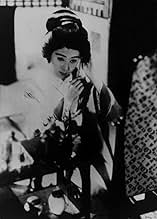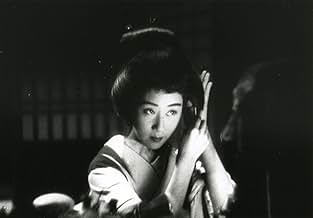IMDb RATING
7.4/10
3.2K
YOUR RATING
Two geisha sisters lead a hard life in the Gion district of Kyoto. After one of them feels obliged to support a bankrupt businessman, the other sister sets up various schemes to get rid of h... Read allTwo geisha sisters lead a hard life in the Gion district of Kyoto. After one of them feels obliged to support a bankrupt businessman, the other sister sets up various schemes to get rid of him.Two geisha sisters lead a hard life in the Gion district of Kyoto. After one of them feels obliged to support a bankrupt businessman, the other sister sets up various schemes to get rid of him.
- Director
- Writers
- Stars
- Awards
- 1 win total
Namiko Kawashima
- Oemi Furusawa
- (as Kazuko Kuno)
Fumio Ôkura
- Jurakudo, the antiques dealer
- (as Fumio Okura)
- Director
- Writers
- All cast & crew
- Production, box office & more at IMDbPro
Featured reviews
This film is about geishas on Kyoto, Japan, in how they live and ply their trade. Since it was made by Mr. Mizoguchi, who seemed to have a fascination with prostitutes, it is right up his alley. While good, the story did not completely grab me like some of his others, especially "Street Of Shame" and "Ugetsu". The film's success is in the message it portrays as to these ladies, that they are somewhat trapped in their existence with no way out, broke and looking for a patron to take them out of that life. However, I did not find the characters to be as developed as I would have liked, so the film loses steam, even though it is a fairly short film, much less than ninety minutes. Still worth watching, it just doesn't have the depth of some of his other films.
Mizoguchi creates a tiny universe with a few characters that somehow manages to maintain in balance throughout the entire film. This is achieved because every character feels real, that means they can be right and wrong and there is not a single character that has the absolute truth.
Very simple filmmaking precisely thought out. With no ostentation the director decides to stay in the shade and put the story and characters in the spotlight.
After watching It on DVD a couple of years ago, I got to see It on the big screen thanks to the Bilbao Art House Zinema.
After watching It on DVD a couple of years ago, I got to see It on the big screen thanks to the Bilbao Art House Zinema.
"Sisters of Gion" is a Japanese film directed by Kenji Mizoguchi. It apparently must be very well thought of, as it's part of a set of Mizoguchi films in a DVD set from the artsy Criterion Collection. While I could see the artistry of the cinematography, I wasn't super-impressed by the story. It left me a bit flat.
When the film begins, it looks a bit like a Yasujirô Ozu film because the camera in set at a level about that of a person sitting on the floor. And, like Ozu, the camera lens does not move back or forth.--it's a stationary box. But, unlike Ozu, while the cameraman does not move the camera, it does move on a track--making for an incredibly interesting opening shot. In fact, the film is full of interesting shots--with unusual angles, composition and depth. It's almost like the camera is a tiny one that is peeking into rooms--and it's very nice--probably the nicest looking Japanese cinematography from this era that I have seen.
Now the story of "Sisters of Gion" ("Gion No Shimai") is not particularly enjoyable--mostly because the folks in it aren't particularly likable and the story is only mildly interesting--except, perhaps, to someone wanting insight into the role of women in 1930s Japan. This aspect of the film is unusual--how one woman embraces power and her sister embraces conventionality and kindness. It's obvious the film was not meant as a feel-good film but a sad portait of the lives of women in the lower classes.
A man has just lost his business and moves in with the geisha he used to sponsor. You might have felt sorry for him, but in the process he left his family and seemed very self-involved. This geisha he goes to is a very nice and dutiful woman, as she is under no obligation to take him in but she does. However, her younger sister, also a geisha, is rather conniving and VERY practical. She will get a wealthy sponsor one way or another. This, ultimately, leads to a rather interesting relationship with Mr. Kimura--but you'll have to see that for yourself. I'd say that the acting, camera-work and direction were good. But I just didn't care a lot for the characters or their problems--though the story was darkly compelling and provocative.
When the film begins, it looks a bit like a Yasujirô Ozu film because the camera in set at a level about that of a person sitting on the floor. And, like Ozu, the camera lens does not move back or forth.--it's a stationary box. But, unlike Ozu, while the cameraman does not move the camera, it does move on a track--making for an incredibly interesting opening shot. In fact, the film is full of interesting shots--with unusual angles, composition and depth. It's almost like the camera is a tiny one that is peeking into rooms--and it's very nice--probably the nicest looking Japanese cinematography from this era that I have seen.
Now the story of "Sisters of Gion" ("Gion No Shimai") is not particularly enjoyable--mostly because the folks in it aren't particularly likable and the story is only mildly interesting--except, perhaps, to someone wanting insight into the role of women in 1930s Japan. This aspect of the film is unusual--how one woman embraces power and her sister embraces conventionality and kindness. It's obvious the film was not meant as a feel-good film but a sad portait of the lives of women in the lower classes.
A man has just lost his business and moves in with the geisha he used to sponsor. You might have felt sorry for him, but in the process he left his family and seemed very self-involved. This geisha he goes to is a very nice and dutiful woman, as she is under no obligation to take him in but she does. However, her younger sister, also a geisha, is rather conniving and VERY practical. She will get a wealthy sponsor one way or another. This, ultimately, leads to a rather interesting relationship with Mr. Kimura--but you'll have to see that for yourself. I'd say that the acting, camera-work and direction were good. But I just didn't care a lot for the characters or their problems--though the story was darkly compelling and provocative.
Master Mizogushi placed on screen two different kind of look of the gueishas's world, although they are sisters, the older is more wise and understanding about his position, the younger is more cold having in the men just a way to get an easy money, handling according her will, actually she hates them, along the movie the viewers will see two side of the street in two human being whose the life hurt too hard, nice piece of art of study of human nature!!!
Resume:
First watch: 2018 / How many: 1 / Source: DVD / Rating: 7.25
Resume:
First watch: 2018 / How many: 1 / Source: DVD / Rating: 7.25
In the early days of film writing "Sisters" was often cited as one of the great films EVER; it is probably right that this quiet, measured film is now not viewed as such.
Still, I found it held my interest easily and was effecting. The acting is admirable, and the sadness of the women's plight are expressed without sentiment. Well worth seeing; 8 out of 10.
Still, I found it held my interest easily and was effecting. The acting is admirable, and the sadness of the women's plight are expressed without sentiment. Well worth seeing; 8 out of 10.
Did you know
- TriviaDaiichi Studio went into bankruptcy following the poor commercial results of the film.
- ConnectionsReferenced in Aru eiga-kantoku no shôgai (1975)
Details
- Release date
- Country of origin
- Language
- Also known as
- Sisters of the Gion
- Production company
- See more company credits at IMDbPro
Box office
- Gross worldwide
- $17,807
- Runtime1 hour 9 minutes
- Color
- Aspect ratio
- 1.37 : 1
Contribute to this page
Suggest an edit or add missing content





















